Some highlights this week:
- Charlottesville City Council on Monday will review a set of recommendations from a Downtown Mall committee that wants dedicated staff to implement their ideas. Many of the ideas have been floated before, but you might not know that from the report.
- One of the biggest issues of our time is professionalization of fire and EMS workers and rising costs to pay for fire trucks and other apparatus. Louisa Supervisors will consider a budget supplement related to help cover shortfalls in FY24.
- UVA has pledged to use its land to build between 1,000 and 1,500 affordable units and the first project goes before Charlottesville’s Board of Architectural Review on Tuesday.
- Charlottesville Area Transit seeks input on its draft strategic plan and there is a virtual meeting on Tuesday for anyone who wants to learn more about what the agency wants to do through 2034 to increase ridership.
- Nelson County’s Planning Commission on Wednesday will review suggestions on how to bring the zoning code into line with the recently approved Comprehensive Plan.
- A Christian academy in Albemarle wants to eventually submit a rezoning to increase enrollment to a maximum of 500 in a new building, but for now they want permission to put up temporary buildings to accommodate the 150 students they’re allowed to have now. A community advisory committee will get a first look.
- There are no meetings in Greene County this week and only one in Fluvanna County.
Thanks as always to the Piedmont Environmental Council for their sponsorship of this particular version of the newsletter. There’s still time to get tickets for their annual meeting on June 1.
Monday, May 20, 2024
Council to review action plan for Downtown Mall
For me, the most interesting parts of the Charlottesville City Council meetings are the work sessions at the beginning. There have been so many this year that I’ve not had a chance to write up in detail, but a recent example is the two part series I recently wrote from the May 6 work session.
- Charlottesville transportation planners seeking to rebuild public trust, May 16, 2024
- Transportation planning manager updates Charlottesville City Council on existing projects, May 17, 2024
There are two items on the work session agenda for May 20 that begins at 4 p.m. (meeting overview)
The first is on the annual report from the Youth Council, an appointed body supported by the Department of Human Services. This year, the group worked with the Youth Action Lab at the University of Virginia’s School of Education and Human Development.
“The Youth Council’s interests centered on the state of education in Charlottesville,” reads the staff report. “Specifically, they asked, ‘In Charlottesville, what is the relationship between education access and inequity? How have educational inequities and segregation changed in Charlottesville after the pandemic?’”
The Youth Council will make recommendations.
The second item will review the “Guidelines and Recommendations for the Charlottesville Downtown Mall.” That’s the culmination of a year-long study by a 17-member committee.
“In considering what is required to maintain the Mall for the next 50 years, it is necessary to understand the successes and failures of the space and its specific elements,” reads the introduction to the report. “With that, it is necessary to evaluate and modify the City’s decision-making and management structure related to the Mall.”
Before proceeding any further, I recommend reading Carol Diggs’ cover story in C-Ville Weekly.
Of the committee’s many recommendations, the report prioritizes these four:
- Create a consistent presence of staff on the Mall to enhance cleanliness and safety for all users
- Implement the proposed Tree Management Plan
- Create a plan for safety and aesthetic lighting of the Downtown Mall and create guidelines for current and future lighting
- Re-imagine the outdoor cafe spaces
That last bullet could involve shrinking available space and possibly charging more to businesses who use them.
“The overall concept should be retained, with evaluation of the sizes and configurations considered in order to address access and pedestrian circulation issues,” reads page 14 of the plan. “Café pricing structures should be reevaluated and adjusted to reflect the value of these outdoor areas.”
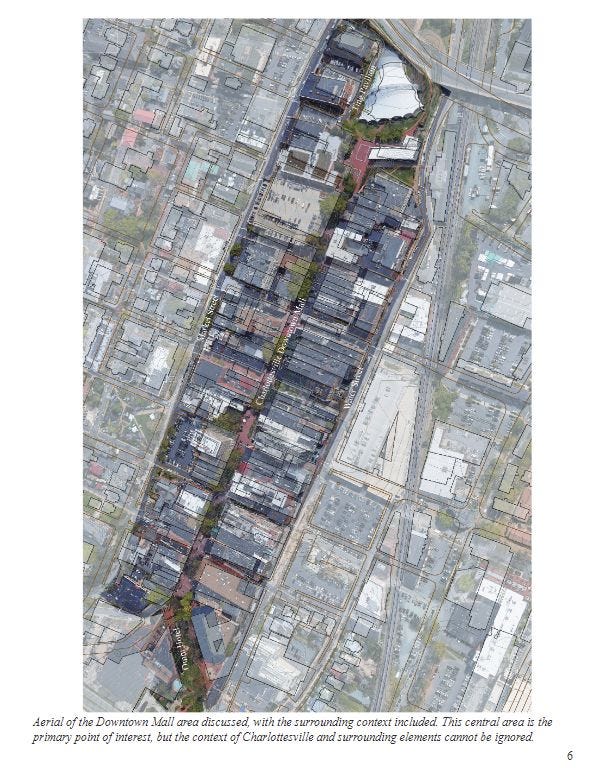
One of the other suggestions is to create a specific division in city government to manage the Mall and to ensure funding is in place for improvements.
“Currently responsibility for various aspects of the Mall is held by Parks & Recreation, Neighborhood Development Services, the Department of Public Works, and the Office of Economic Development,” reads page eight of the plan. ”This divided responsibility is not adequate for the caliber of maintenance, updates, and management expected for an area of prime economic and community value.”
Another is to create a cohesive strategy for parking and delivery to businesses.
“The parking strategy should consider installing modern parking meters for street parking with the intent of increasing the availability of parking by efficiently guiding users to the most appropriate parking resource,” reads a section of page 12.
As a sign of how much turnover there’s been in the community, the city installed meters as recently as 2017 and abandoned it before a six month pilot had been completed. When I was at Charlottesville Tomorrow, I covered this extensively. A month after the pilot ended, then-parking manager Rick Siebert briefed the now defunct PLACE Design Task Force. A book could be written about this epic failure.
There’s also a suggestion to install more public seating per the original design of the Mall. This is another subject that was actively discussed before the summer of 2017.
“The existing chairs in storage should be repaired and installed on the Downtown Mall, beginning with Central Place,” reads another portion of page 14. “The Committee voiced strong interest in having more moveable seating on The Mall again.”
One of my colleagues at Charlottesville Tomorrow has a story from July 23, 2017 on the last time this idea was floated. It stalled. Like all of my stories, these are all “uncategorized” stories. Still, I’m grateful the new management did not erase them. They’re still posted and worth reading to find out what happened the last time these things were discussed.
The committee also calls for more funding. There is no mention of creation of a business improvement district, an idea that was floated ten years ago. Here’s another uncategorized story. Another uncategorized story is when the now-defunct Downtown Business Association of Charlottesville pulled their request in March 2015.
Want more stories like this? Pay for a subscription to Charlottesville Community Engagement. As with them, I try to cover as much as I can.
The regular meeting begins at 6:30 p.m. There are three proclamations:
- The Charlottesville Alumnae chapter of the Delta Sigma Theta Sorority is celebrating its 55th anniversary (read the proclamation)
- May is Amyotrophic Lateral Sclerosis (ALS) Awareness Month (read the proclamation)
- May 19 through May 25 is Public Works Week (read the proclamation)
There are two public hearings.
- The first is another amendment to the new Development Code related to acquisition of property by the city. It’s fairly technical and appears to be a housekeeping item. (staff report)
- The second is on the city’s action plan for spending federal Community Development Block Grant and HOME funding. (staff report)
Louisa Board of Supervisors to consider budget supplement for Fire / EMS cost overruns
The seven-member Board of Supervisors in Louisa County will meet at 5 p.m for a closed session followed by an open one at 6 p.m.
There are four items on the consent agenda.
- Louisa County now owns the Louisa County airport and must appropriate revenue to its continued functions. Operations generated $17,302 in revenues from hangar rentals and $113,772 in the sale of fuel for airplanes. (resolution)
- Supervisors will recognize Jodi Dalton as Louisa County’s Educator of the Year. Dalton is a special education teacher with 38 years of service in the county. (resolution)
- Supervisors will also recognize Cheryl Sites as the most valuable player of the year. Sites is an instructional assistant who’s been working for county schools since 2011. (resolution)
- Supervisors will authorize a future public hearing on the sale of 13.3 acres of surplus land in the Jackson District Magisterial District. (resolution)
There will be two discussions. One is on potential amendments to the Technology Overlay District ordinance and another on the solar ordinance. There’s no information in advance on either topic, but the Planning Commission had a public hearing earlier this month on lowering the maximum amount of land that can be used for utility-scale solar development.
There are two items under new business.
- The first is a pair of budget supplements for FY2024 related to increased costs to provide fire / EMS services. The Transportation Department is seeking $150,000 to cover repair and fuel costs. The Department of Fire and EMS is seeking $680,000 for increased personnel and overtime costs. (read the resolution)
- The second related to the purchase of a rescue boat for the New Bridge Fire and EMS station. The funding comes from a donation from the Foundation for Lake Anna Emergency Services. Supervisors have to approve the pass through of $108,000 for the purpose. (read the resolution)
Finally, there is a public hearing for the rezoning of 7.714 acres of land from Agricultural-2 to Commercial General Growth Area Overlay District for a storage facility. The Planning Commission recommended approval on April 11. (staff report)
Amendment seeks more units in Dunlora Park Phase II
The Housing Albemarle plan adopted by the Board of Supervisors in July 2021 calls for thousands of new units to try to fulfill demand. That has prompted some developers to dust off old plans to request amendments for additional units.
For instance, the Great Eastern Management Company has asked to amend the rezoning for North Pointe to increase the number of dwellings from a maximum of 893 to 1,548. That request is still pending.
There are other examples of this occurring on a smaller scale. Dunlora Park is a project that’s been developed in two phases with the first consisting of 12 single-family detached units and 16 townhouse units. The site plan approved last April for the second phase was to have been for three single-family detached units and three townhomes.
Now Dunlora Park Investments has filed for an amendment to replace the three single-family detached units with eight townhouse units for a total of eleven in this phase. Two of these will be affordable under the county’s guidelines.
The Albemarle Architectural Review Board will take up a Certificate of Appropriateness for the amendment at their meeting on Monday at 1 p.m. (meeting info)
In another meeting:
- The Board of Trustees for the Jefferson-Madison Regional Library meet at 3 p.m. in the Crozet Library. Topics include a discussion of the system’s five-year plan, community partnerships, the equipment budget for FY25, and revenue from fines. You can watch this one on Zoom. (agenda)
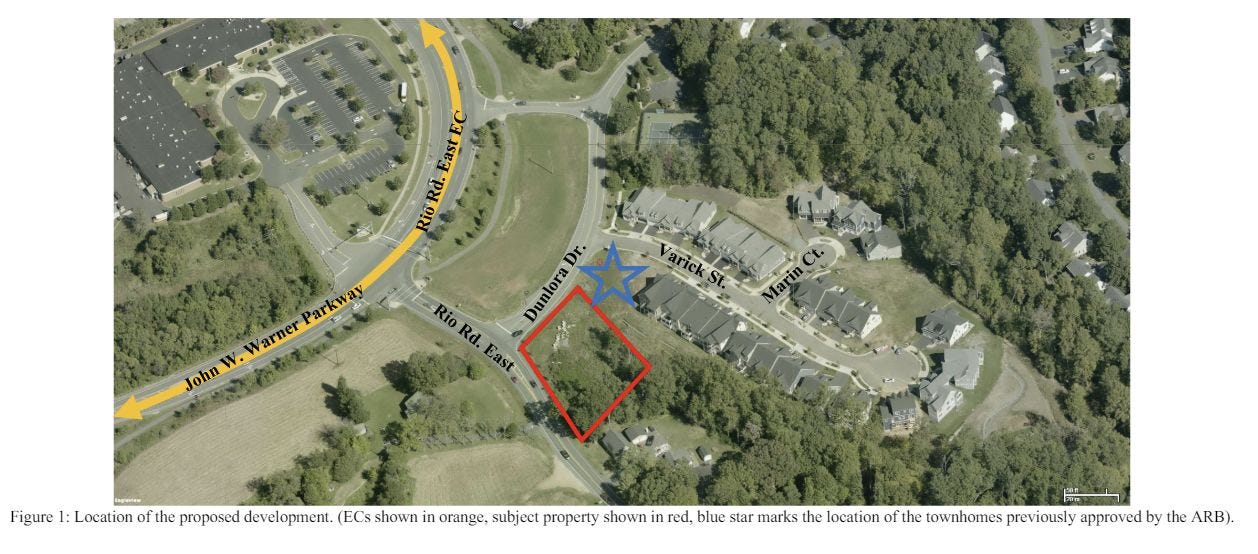
Tuesday, May 21, 2024
Charlottesville BAR to take first look at 10th and Wertland affordable housing project
The University of Virginia Foundation is implementing a University of Virginia initiative to build between 1,000 and 1,500 affordable units in the community at three locations. The Board of Visitors had an update on Leap Day that I wrote up for C-Ville Weekly.
One of those sites is at the corner of 10th and Wertland on two acres owned by the UVA Foundation. An organization called the Preservation of Affordable Housing has been selected as the nonprofit developer.
The Charlottesville Board of Architectural Review will hold a preliminary discussion at their meeting which begins at 5 p.m. in CitySpace. (agenda packet)
From the packet, we learn that a portion of the property is currently owned by the University of Virginia, but they will transfer a portion of 1105 West Main Street to the foundation by the time building permits are submitted. Stacy Hall, which was built as a Sears, will remain in place. A building constructed in 1982 will be demolished to make way for the new.
This is one of the first major projects to be submitted under the new Development Code which allows up to 11 stories and unlimited density for properties under the Corridor Mixed Use 8 district.
However, the plans drawn up by Grimm + Parker are for a six story building described as a “podium style mixed use building” with a range between 150 and 190 affordable units. There would be up to 16,000 square feet of retail on 10th Street with a 90 space parking garage below the building.
The BAR does not have any say over what will need to happen to address impacts to traffic, but the new Development Code does require any project over 50,000 square feet to create a transportation demand management plan. That will require a public meeting at some point.
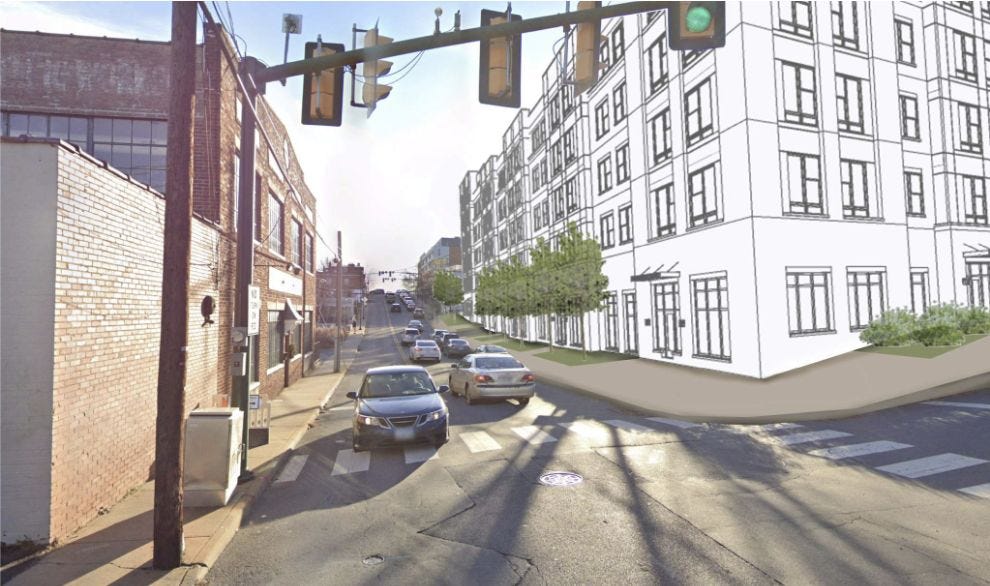
There’s also a proposal from the owners of 113 West Main Street to build a private courtyard which requires railing and fences.
In another item, The Little Mod Hotel at 207 14th Street NW seeks a Certificate of Appropriateness for a mural on the eastern side.
From the minutes of the April 16 meeting, we learn that the First United Methodist Church will be able to install solar panels on their roof. The Board of Architectural Review approval of replacement of some of the asphalt shingles with standing-seam metal upon which the panels will be attached.
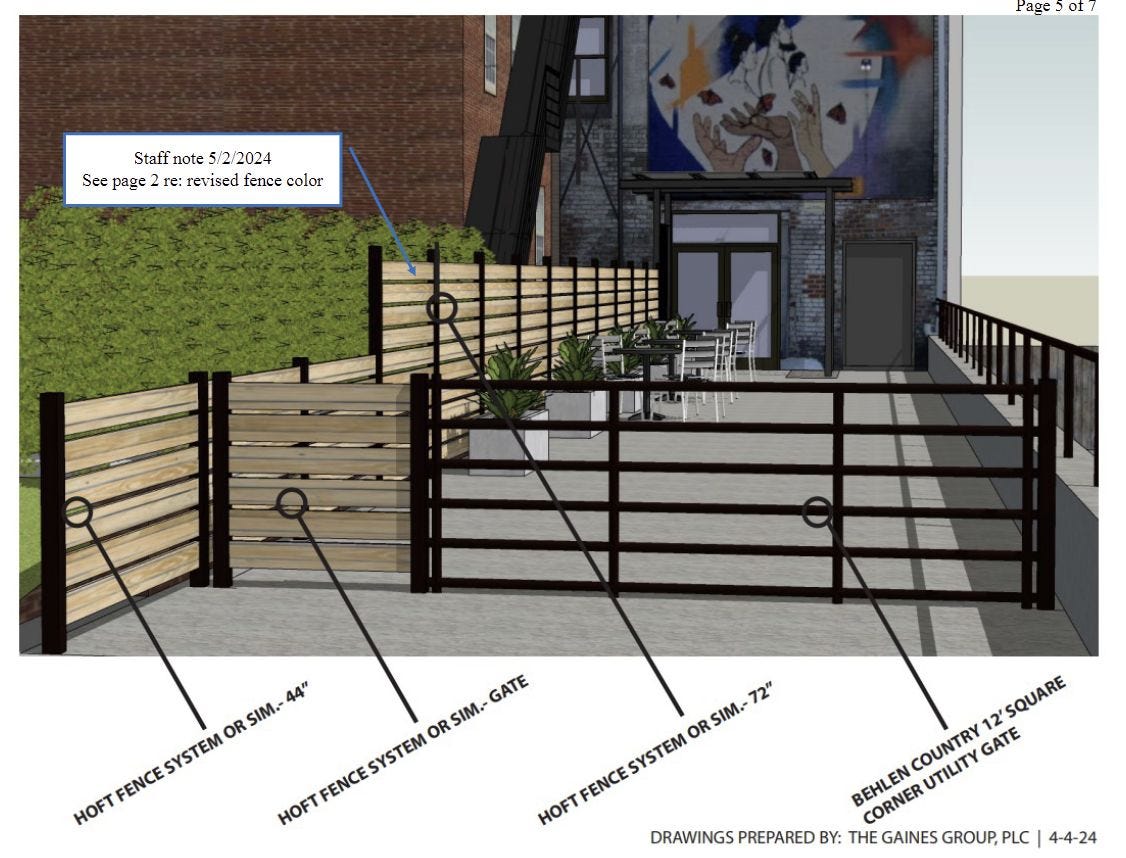
Virtual meeting to learn more about Charlottesville Area Transit’s plan to increase ridership
I am currently in Illinois because I drove out here to be present during a delegation of elected officials and staff as they visited the Champaign-Urbana transit organization to get a close-up view of the electrolyzer that enables the production of hydrogen that powers about a dozen buses in their fleet. That story may take a week or so to write up but it will be worth the wait.
On Tuesday at noon, Charlottesville Area Transit will hold the second of two virtual meetings on the development of a new transit strategic plan. To keep this installment shorter so I can go out and explore where I am, take a look at the story I wrote on the plan and what’s in it.
“This presents [Charlottesville Area Transit] with an opportunity to evaluate and update our services and network to respond to changes in our community,” reads the website for the transit strategic plan.
Input is being taken through May 31. I hope to write another version from this meeting but not until after I write up the delegation story. (meeting info)
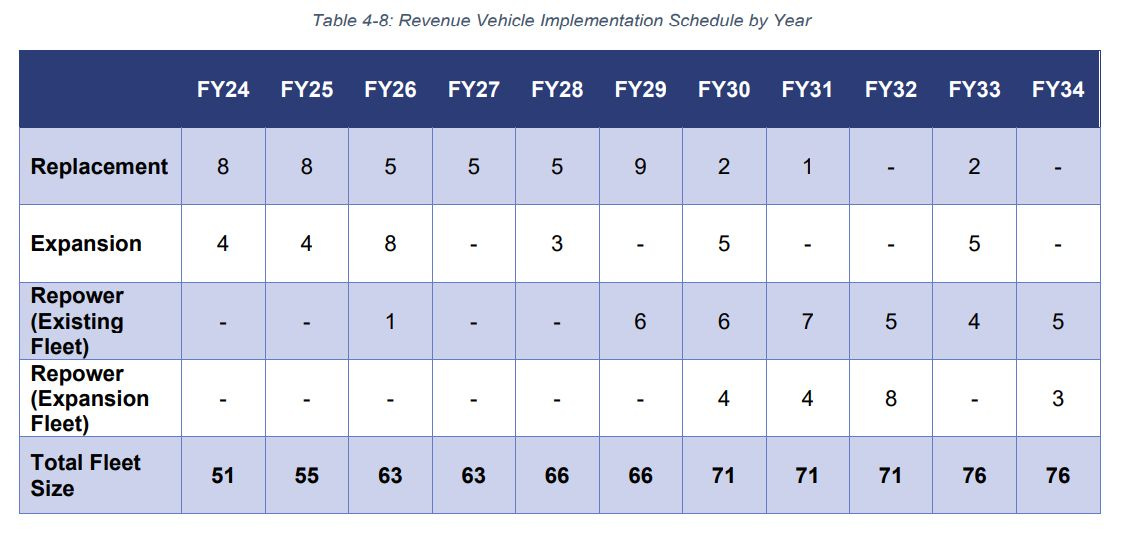
MPO to adopt long range transportation plan, approve Smart Scale submissions
The policy board of the Charlottesville-Albemarle Metropolitan Planning Organization usually meets on Wednesdays, but they’ve moved this month’s meeting to Tuesday. There’s a lot on this agenda. They meet at 407 Water Street (meeting agenda)
There are some substantial items on the agenda including adoption of the long range transportation plan. Every metropolitan area with localities that receive federal dollars has to create the document.
“This federally-mandated plan outlines the region’s priority transportation improvements over the coming decades,” reads the executive summary on page 14. “The Long-Range Transportation Plan is a fundamental document for our community. It states our region’s collective vision for the future of our transportation system, and it identifies projects that we anticipate our region will implement in the foreseeable future.”
These plans divide projects into “constrained” and “vision” lists. The plan makes an estimate of how much federal funding might flow into the community. A project on the constrained list is eligible for those dollars but ones on the vision are not. The MPO can take a vote to change that at any time during the plan’s horizon.
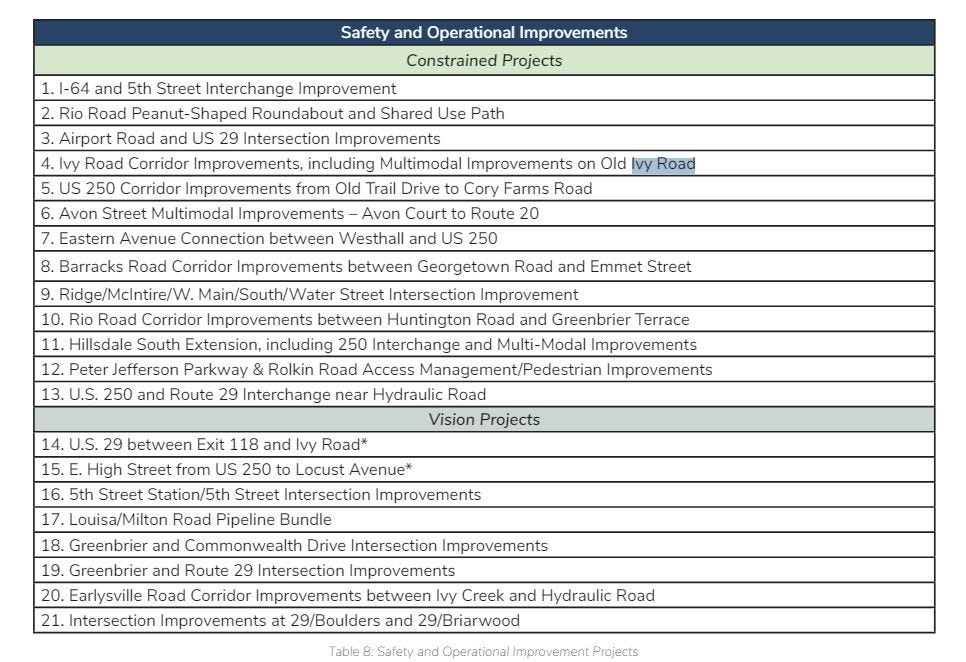
Next up, the MPO Policy Board will get an update on the two pipeline studies underway. A public survey for the Old Ivy Road / Ivy Road corridor was extended until May 17, and one for the Barracks Road closed earlier this year. Both are on the constrained list in the long range transportation plan.
After that, the MPO Policy Board will adopt resolutions endorsing submissions for the Virginia Department of Transportation’s Smart Scale process. The entity in parentheses is the party officially making the application.
- US250/Peter Jefferson Parkway and Rolkin Road Project Pipeline Bundle (MPO)
- I64/Fifth Street Interchange Improvement (Exit 120) (MPO)
- Barracks Road Pipeline US 29/250 Interchange and Shared Use Path (MPO)
- Barracks Road Pipeline Corridor Improvements (MPO)
- Old Trail Drive and US 250 West Intersection Improvements (Albemarle County)
- Rio Road and Hillsdale/Northfield/Old Brook Improvements (Albemarle County)
- Barracks Road and Georgetown Road Improvements (Albemarle County)
For the second cycle in a row, Charlottesville is not submitting candidates because of a backlog of unfinished projects.
Finally, the MPO will discuss an update that VDOT is doing on the classification of roads. This is significant because the way a road is classified determines what sorts of improvements can be made. There’s a map of the Culpeper Districts for review.
In other meetings:
- The technical committee of the Charlottesville-Albemarle Metropolitan Planning Organization will meet at 10 a.m. at 407 Water Street. They’ll get an update on the long range transportation plan and get updates on the two pipeline projects. It’s a very similar agenda to the one for the MPO Policy Board meeting that’s listed above. (meeting agenda)
- The Rural Transportation Advisory Committee will meet at 407 Water Street Center at 1 p.m. (meeting info)
- The Albemarle County Department of Social Services will meet at 3:30 p.m. in the county office building at 1600 5th Street in Room 231. There will be a discussion of Older Americans Month and efforts to stop abuse. (meeting info) (recent story on annual report)
- The Albemarle Economic Development Authority meeting that had been scheduled has been canceled. They’ll next meet on June 18. (meeting info)
- The Fluvanna Board of Zoning Appeals meets at 7 p.m. but there’s no agenda and no location given. (meeting info)
Wednesday, May 22, 2024
Nelson County Planning Commission to review suggestions to reform zoning
As soon as Nelson County adopted a Comprehensive Plan update in April, the Berkley Group got to work on a review of the way land use decisions are made to see if they match the intent of the new version of the advisory document.
“Nelson County’s Zoning and Subdivision Ordinances should be revised to reflect current best practices in zoning and land use; to strengthen the ability to implement the strategies and priority items of the current Comprehensive Plan; and to improve clarity and ease of use,” reads page 14 of the agenda packet.
The consultant recommends several items such as combining the zoning ordinance and subdivision ordinance into one document and updating language. They also recommend updates.
“The Zoning and Subdivision Ordinances should be updated to meet the strategies of the Nelson 2042 Comprehensive Plan, including adding low impact design and landscaping standards, allowing for increased density and alternative residential uses, implementing greater conservation regulations in sensitive areas, and others,” the report continues.
The Berkley Group also recommends creating the provision for a civil penalties for zoning violations. Currently they are misdemeanors. Other suggestions include combining the uses of “bed and breakfast” and “vacation home” into a “short-term rental” use as well as creation of an Accessory Dwelling Unit provision.
The Nelson County Planning Commission will meet at 7 p.m. in the General District Courtroom in Lovingston to discuss the recommendations. (meeting info)
In other meetings:
- The Charlottesville Retirement Commission will meet at 8:30 a.m. in the basement conference room in City Hall. There will be a discussion of “emergency medical technicians as public safety employments.”
- The Albemarle Board of Equalization will have their organizational meeting for the year as a virtual meeting. This will be held at 1:30 p.m. (meeting info)
- The executive committee of the Regional Housing Partnership is at 2 p.m. (meeting info)
- The Albemarle Broadband Authority meeting scheduled for today has been canceled. They’ll next meet on June 26. (meeting info)
- The Albemarle Fire EMS Board will meet at 1800 hours (6 p.m.) in the county’s office building at 1600 Fifth Street Extended in Room 246. (meeting info)
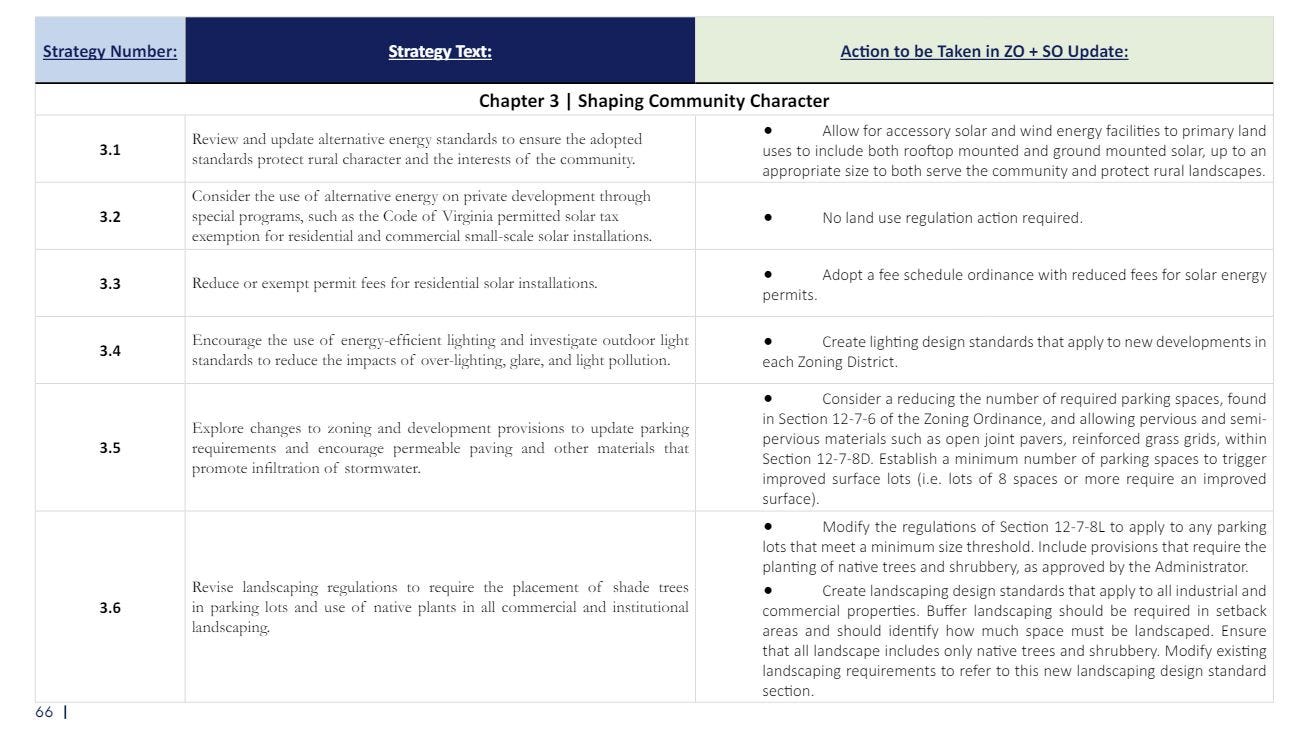
Thursday, May 23, 2024
Places29-Rio group to review private school request to hold class in temporary buildings
Albemarle’s Community Advisory Committees provide a number of functions. The May meeting of the Places29-Rio CAC demonstrates two of these. They’ll gather in Room 241 of the county’s office building at 401 McIntire Road at 6 p.m. (meeting info) (agenda)
The first is a community meeting for a special use permit for Community Christian Academy on Old Brook Road. They are seeking permission to construct modular buildings on the property to accommodate increased enrollment.
The Board of Supervisors approved a special use permit in 2012 to allow Community Christian Academy to run pre-K through 12th grade at the site at Crosslife Community Church for up to 85 students.
“We had incremental growth for multiple years, but when the pandemic shut down the public schools for in-person education, we suddenly filled up all our classes,” reads the narrative.
Community Christian Academy moved middle-school students to RiverStone Church in 2022 after securing a special permit from the county. Supervisors also approved an amendment to the permit to increase enrollment at Crosslife to 150.
However, RiverStone Church rents their building and the lease will expire in June. As a solution, CCA proposes installing three modular structures at the Crosslife site as a first phase. For that, they need a special use permit to be able to accommodate the middle school classes this upcoming year. They will submit a rezoning in the future for a permanent structure.
The second item at this meeting will be a broad overview of the county’s rules and regulations on stormwater management. Albemarle’s chief of environmental services and the water resource program manager will give a “presentation on and discussion around the County’s role in responding to and assisting property owners with resolving drainage issues and the County’s program to maintain public drainage infrastructure in urban areas through mapping, cleaning, assessing, and repairing.”
For more information, take a look at Albemarle’s website on the topic.
In one other meeting:
- The Charlottesville Police Civilian Oversight Board will meet at 6:30 p.m. They will have a presentation from Police Chief Michael Kochis and Commonwealth’s Attorney Joe Platania on the use of force. (meeting info)
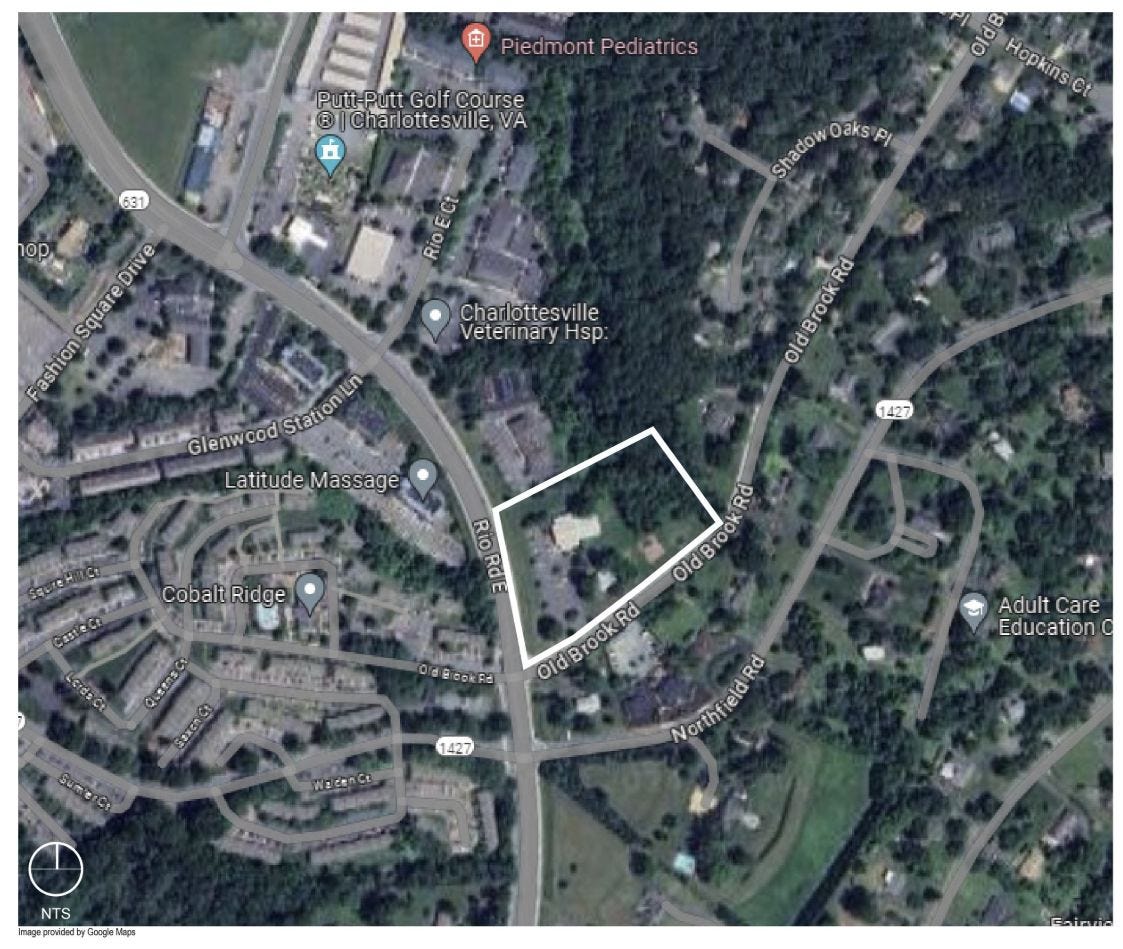
This post was contributed by Sean Tubbs. Sean is a journalist working to build a new information and news outlet centered around Charlottesville and Virginia. In 2020, he launched a daily newscast and newsletter and also created a semi-regular podcast on the pandemic.
Support for Sean’s “Week Ahead” update comes from The Piedmont Environmental Council.
